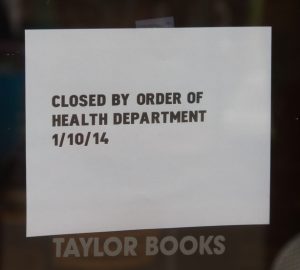Front Porch Blog

The chemical spill in West Virginia should be a wake up call for North Carolinians to demand lawmakers put health and the state’s resources ahead of profit-driven industry agendas. Photo by @iwasaround / Flickr
There is a lesson in West Virginia’s water crisis for North Carolina policymakers and regulatory agencies akin to the saying that those who do not learn from history are doomed to repeat it. If you look at the changes to and by the N.C. Department of Environment and Natural Resources in 2013 and the road ahead, the General Assembly seems resolved to run headlong down a shortsighted path that will lead to the same inevitable consequences.
For years, West Virginia’s lawmakers and environmental regulators have been swayed by coal, chemical and other industries that helped give them influence and power in the first place. Motivated by profit, those industries influence how environmental regulations meant to protect the public are created and enforced. With that influence and a captive audience, they claim that strong environmental protections cost too much and burden the economy.
The North Carolina legislature and the top administrators in DENR are blazing down a similar path toward deregulation trail they call “progress.” But progress for who and toward what? This year, the Regulatory Rules Reform (HB 74) Act, enacted by the General Assembly and overseen through appointed committees, is poised to determine what DENR protections should be re-adopted, which will be changed, and which will expire altogether.
DENR’s regulatory divisions have been underfunded and agency’s staff has been reduced to a skeleton crew but is still expected to perform the monumental job of protecting our environment and public health. Secretary John Skvarla has even publicly mocked environmental groups for being critical of the administration and legislature’s and stated time and again their goal in growing the economy.
Skvarla’s description of DENR as a “customer friendly juggernaut” is actually quite accurate when you realize the “customer” no longer refers to the state’s environment and natural resources, but is now defined as the businesses and industries seeking permits. And since a juggernaut is defined as an “overwhelming, advancing force that crushes or seems to crush everything in its path” then yes, the description in Skvarla’s letter to the editor is accurate. DENR: an unstoppable business-friendly force, willing to crush everything in its path, including its state’s environmental resources and protections enacted to protect citizens right to clean air and water.
Most North Carolinians feel it is the government’s job to ensure safe, clean air and water resources for its citizens. Why do we not see that reflected in lawmakers and regulators’ actions? Maybe it’s because of political donations — in North Carolina, millionaire Art Pope and Duke Energy have used their pocketbooks to influence policy.
The spill in West Virginia should be a wake up call to North Carolinians. Are weaker regulations and fewer environmental protections what we want for our state? Do we want to be in the same position where our industries run roughshod over public health, go largely uninspected and unchecked for decades, and where regulations we do manage to keep fail to provide any meaningful enforceable provisions for accountability?
North Carolinians can change how this story ends. It’s time we demand our lawmakers put citizen’s health and the precious, limited resources of our state ahead of profit-driven industry agendas. As another saying goes, “It doesn’t matter how far you’ve gone down the wrong path, you can always turn around.”
PREVIOUS
NEXT
Related News

Leave a comment
Your email address will not be published. Required fields are marked *

This is almost prophetic after reading of the coal ash spill in North Carolina. Rather frightening.